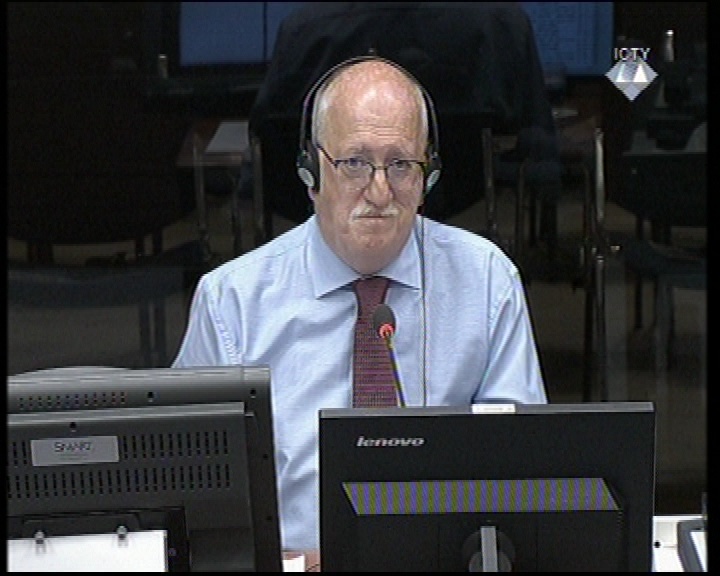Home
WITNESS WITH MEMORY PROBLEMS
Belgian lieutenant Jan Segers testified today in Ratko Mladic’s defense. After trying for three hours to establish when specific incidents he mentioned in his evidence had actually happened, it turned out that the witness has memory problems caused by the medication he has been taking
 Jan Segers, defense witness at the Ratko Mladić's trial
Jan Segers, defense witness at the Ratko Mladić's trial Ratko Mladic’s defense called Belgian lieutenant Jan Segers in a bid to bolster its arguments that the Markale incident was caused by a planted explosive device, that the BH forces targeted the Sarajevo TV building and fired mortars from the Kosevo hospital compound to provoke the Serb side to return fire. The proof of the pudding will as always be in the eating: the Trial Chamber will consider and assess the reliability of Segers’s evidence. After three hours of wrangling, the witness admitted that he had problems with remembering things in the last two years because he had been undergoing chemotherapy.
From 1991 to 1995, Segers was deployed in the former Yugoslavia: first with UNPROFOR in Sarajevo and Kiseljak, and later as a military observer in Bihac, Daruvar, Zagreb and in Kosovo. In November 1995, Segers gave an interview to a Belgian weekly describing his experience in the Balkans. He spoke about the millions of German marks being delivered to the BH Army 5th Corps in the Bihac pocket, a ‘stationary explosive device’ planted in the Markale town market, mortars being fired from the Kosevo Hospital and the shelling of the Sarajevo TV building from the BH Army positions.
In his statement in Mladic’s defense before the Belgian authorities Segers repeated everything from that interview in 1995. After he confirmed it today before the Tribunal, Segers’s statement was admitted into evidence. The defense had no additional questions for the witness.
The witness confirmed that from October 1992 to March 1993 he was in the UN office in Sarajevo, in charge of liaising with the warring factions. He told prosecutor Caroline Edgerton at the beginning of the cross-examination that it had been his task to express concern and to file protests to the Bosnian Serb side for artillery and sniper attacks on the civilians. Segers confirmed that the people in Sarajevo lived in a state of ‘panicked fear’ because of the attacks they were exposed to as they went about their daily activities.
As regards the Markale explosion in February 1994, in which over 60 people were killed, Segers told the court today the same thing he had stated in the interview to the Belgian weekly. According to him, the UN forces always maintained that they didn’t know who was responsible for the explosion but ‘almost surely’ the Serbs were not to blame. There had been ‘rumors’ about a stationary explosive device planted under a market stall. When the prosecutor asked him where he had read that, Segers replied that a UN military observer had told him that. The man happened to be at the site of explosion immediately after it happened. According to Segers, the military observer also told him that they couldn’t analyze the crater because the explosion had been caused by a stationary device.
Segers claims he was given this information in his office in the PTT building in Sarajevo, on the day of explosion in February 1994, but he had told the judges earlier that he had left Sarajevo by the first half of 1993. When the prosecutor and judges asked him a direct question several times, Segers told them that in 1994 he was no longer in Sarajevo.
Segers’s evidence on other incidents was similarly confusing. In the interview, Segers claimed that the Sarajevo TV building was shelled by the BH forces in May 1995, today he said that it happened while he was still in Sarajevo: in the first half of 1993. Finally, when Judge Orie asked him outright, the witness explained the reasons for his poor memory.Linked Reports
- Case : Mladic
- 2016-04-26 CONTESTING TOMASICA EVIDENCE
- 2016-04-25 BELGRADE PATHOLOGIST’S ‘LONDON CONNECTIONS’
- 2016-04-21 CLOSE TO ACCUSED AND INCONSISTENT IN EVIDENCE
- 2016-05-02 DEFENSE: PROSECUTION EXPERT’S ‘STATISTICAL EXHIBITIONISM’
- 2016-05-03 IT DOES NOT MATTER IF VICTIMS WERE ARMED OR NOT, AS LONG AS THERE WAS FIGHTING
- 2016-05-20 WHO CAN(NOT) WRITE RATKO MLADIC’S JUDGMENT?
